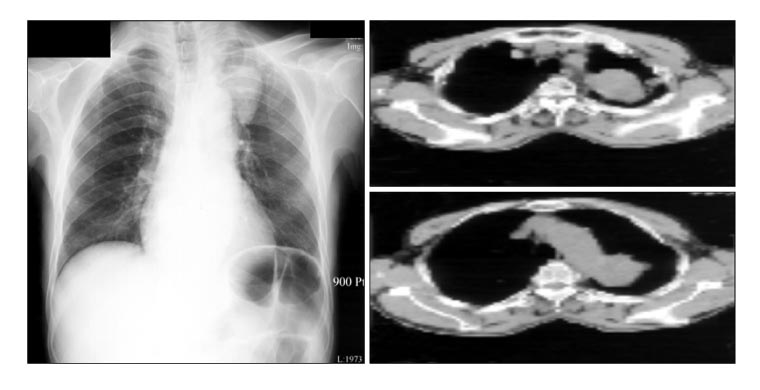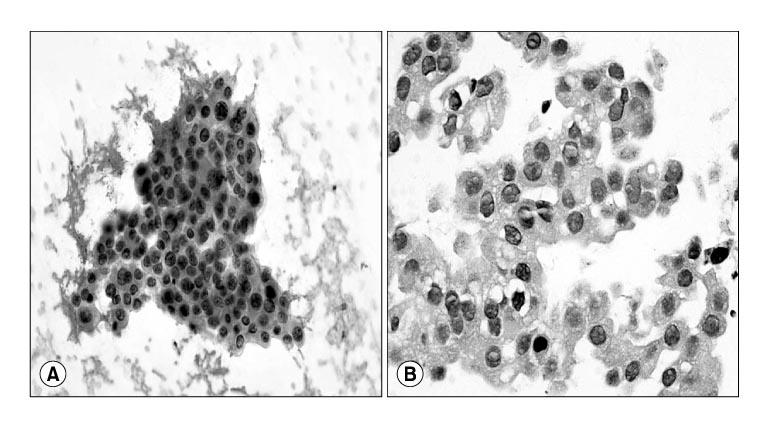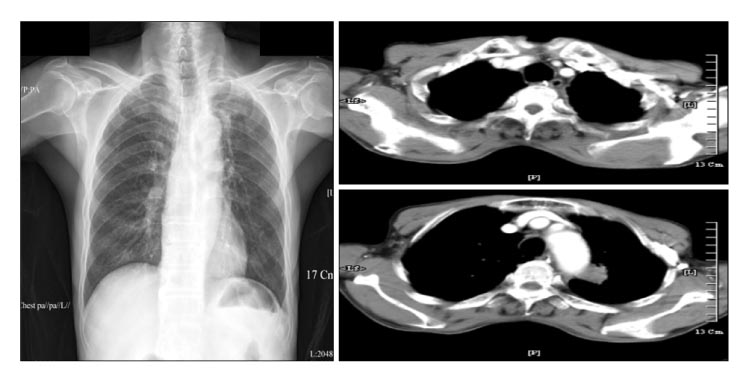Tuberc Respir Dis.
2009 Feb;66(2):132-135.
A Case of Partial Spontaneous Regression of Non-Small Cell Lung Cancer
- Affiliations
-
- 1Department of Internal Medicine, Hallym University College of Medicine, Chuncheon, Korea. trshin@hallym.or.kr
Abstract
- Spontaneous regression is extremely rare in lung cancer and this in spite of its global high incidence. So far, less than 30 such cases have been reported in the literature. We report here on the case of a 68-year-old man who had the diagnosis of adenocarcinoma and in absence of any medical therapy, he had a partial spontaneous regression of tumor.
Figure
Reference
-
1. Everson TC, Cole WH. Spontaneous regression of cancer. 1966. Philadelphia: WB Saunders.2. Everson TC, Cole WH. Spontaneous regression of malignant disease. J Am Med Assoc. 1959. 169:1758–1759.3. Cole WH. Efforts to explain spontaneous regression of cancer. J Surg Oncol. 1981. 17:201–209.4. Challis GB, Stam HJ. The spontaneous regression of cancer: a review of cases from 1900 to 1987. Acta Oncol. 1990. 29:545–550.5. Avinoach I, Aflalo E. Human melanoma cell lines established from metastases of a patients with a completely regressed primary site. Cancer. 1992. 69:113–122.6. Fairlamb DJ. Spontaneous regression of metastases of renal cancer: a report of two cases including the first recorded regression following irradiation of a dominant metastasis and review of the world literature. Cancer. 1981. 47:2102–2106.7. Drobyski WR, Qazi R. Spontaneous regression in non-Hodgkin's lymphoma: clinical and pathogenetic considerations. Am J Hematol. 1989. 31:138–141.8. Chang WY. Complete spontaneous regression of cancer: four case reports, review of literature, and discussion of possible mechanisms involved. Hawaii Med J. 2000. 59:379–387.9. Lowy AD Jr, Erickson ER. Spontaneous 19-year regression of oat cell carcinoma with scalene node metastasis. Cancer. 1986. 58:978–980.10. Horino T, Takao T, Yamamoto M, Geshi T, Hashimoto K. Spontaneous remission of small cell lung cancer: a case report and review in the literature. Lung Cancer. 2006. 53:249–252.11. Hong GY, Park JS, Ruy SS, Kang SJ, Woo YA, Kang MW, et al. A case of spontaneous regression of small cell lung cancer. J Korean Cancer Assoc. 1998. 30:1294–1298.12. Lee YS, Kang HM, Jang PS, Jung SS, Kim JM, Kim JO, et al. Spontaneous regression of small cell lung cancer. Respirology. 2008. 13:615–618.13. Kappauf H, Gallmeier WM, Wunsch PH, Mittelmeier H, Birkmann J, Buschel G, et al. Complete spontaneous remission in a patient with metastatic non-small-cell lung cancer. Ann Oncol. 1997. 8:1031–1039.14. Smith RA. Cure of lung cancer from incomplete surgical resection. Br Med J. 1971. 2:563–565.
- Full Text Links
- Actions
-
Cited
- CITED
-
- Close
- Share
- Similar articles
-
- A Case of Spontaneous Regression of Non-small-cell Lung Cancer
- A Case of Spontaneous Regression of Small Cell Lung Cancer
- Spontaneous Regression of Non-Small Cell Lung Cancer in a Patient with Idiopathic Pulmonary Fibrosis: A Case Report
- Partial spontaneous remission of small cell lung carcinoma with neurologic symptom
- Lymph Node Metastasis after Spontaneous Regression of Non-Small Cell Lung Cancer




